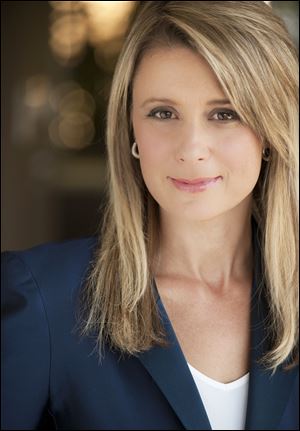
Ex-Waterville woman gets Aussie into politics
Kristina Keneally preps to be CEO of national basketball team
7/26/2012
Kristina Keneally is CEO-elect of Basketball Australia and a Notre Dame Academy graduate.
An Australian recently reached out to Kristina Keneally by way of her Twitter account and asked her to liken a regional rivalry in Australian Rules Football to a vaunted rivalry in the culture of American sports.
Keneally chose one that was familiar to her, given her upbringing in northwestern Ohio: the Ohio State-Michigan rivalry.
The Notre Dame Academy graduate is a former Waterville resident who prepares for her tenure as chief executive officer of Basketball Australia, the governing body of amateur and professional athletics.
She officially takes over the post Aug. 4, when she will join the Australian men's and women's Olympic teams in London for the Summer Games. But Keneally, 43, doesn't have the traditional background that some other candidates for high-profile jobs in athletic administration. She takes over the position with a background in Australian politics, as she rose through the ranks of the Australian Labour Party and was elected as the first female premier -- akin to governor -- of New South Wales, a state in southeastern Australia.
But she draws parallels between being the CEO of a major sports organization and being an active and visible leader in politics.
"Many of the skills are transferable," Keneally said. "The CEO of the Australian Football Federation remarked to me that politics was excellent administration for being a sports administrator. Understanding the needs of stakeholders, setting goals for the organization, and in terms of representing the nation, if you will, at the Olympics, it's an incredible honor."
But Keneally's original passion was for politics. In the fall of 1987, Keneally -- who was then Kristina Kerscher -- enrolled at the University of Dayton, on a partial scholarship to play soccer. Days into preseason practices, she tore the anterior cruciate ligament in her left knee. Continuing with soccer was out of the question, short-term. On campus, she saw a flyer about getting involved in student government and without hesitation, she said, "I'll do it." Keneally's interest in politics continued through college, as she was involved with local and national student-government organizations.
Keneally met her husband, Ben, in 1991 in Poland, where she was a representative of the United States during the Catholic Church's World Youth Day. After she moved to Australia, she became involved with the Australian Labour Party at a time when it made the decision to broaden its base of candidates.
She was elected to the New South Wales legislative assembly in 2003 and she became premier in 2009. In her 16-month term, she was one of Australia's most visible politicians.
"To the surprise of many, Keneally proved to be a plausible and popular premier," David Clune, a political historian in New South Wales, told the Australian in June.
"Her media appearances projected warmth and charm."
However, in the 2011 elections, the Australian Labour Party lost more than half of its seats in the lower house of Parliament and lost its power to appoint a premier. Still, Keneally remained involved in politics until she resigned from Parliament last month. Before taking over full time as CEO of Basketball Australia, Keneally served as chairman of the board of Basketball Australia, establishing a commission for WNBL, Australia's professional women's league. She revived the All-Star game for the NBL, Australia's professional men's league, and she negotiated a stronger television deal for the NBL.
Keneally has already encountered discord, even before officially taking her new post. Earlier this month, Basketball Australia came under fire when it was revealed that the men's Olympic team received business-class seats on its flight from Australia to London for the Olympic Games, while the women's team was seated in economy class.
"In this day and age, there's just no excuse for men's and women's sporting teams to be treated differently when they both compete at the same world-class level," Keneally told the Associated Press. "The disparity is even more glaring when you consider that our women's basketball team is one of the best in the world."
But, Keneally explained, while Australia is a country that is fixated on sports, it's a different landscape -- one in which basketball does not have the same kind of popularity as it has in the United States, as it competes with Australian Rules Football and rugby for both consumer and media attention.
"The basketball culture in the United States is clearly far more dominant in Australia," Keneally said. "With that being said, the Australian culture is one that's completely engaged with and fascinated by sport."
Contact Rachel Lenzi at: rlenzi@theblade.com, 419-724-6510 or on Twitter @RLenziBlade.